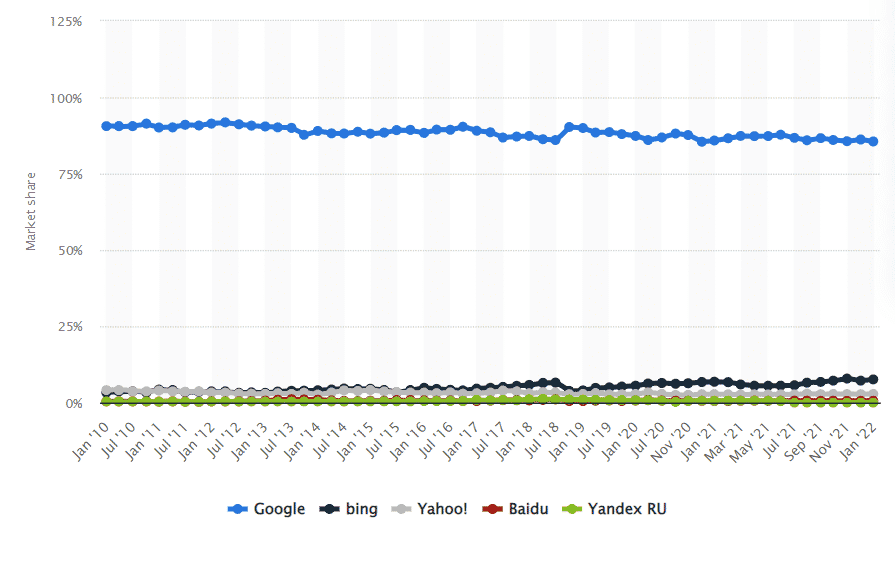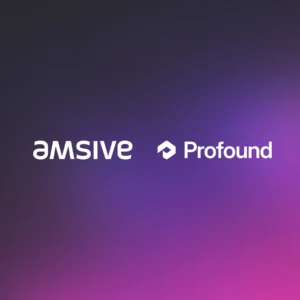Securing the top spot on Google and other search engine results pages is important—but just how important is it really?
If you’ve heard anyone even lightly keyed into the world of SEO in the past decade talk about rankings, you’ve heard about how it’s important to get your website on page one of a search engine results page (SERP), namely Google.
Ranking factors can vary depending on which search engine you’re on, but the overwhelming majority of all online searches across the globe are through Google. As of January 2022, more than 85% of all searches were through Google. Any good SEO plan will account for other search engines, but the focus clearly needs to be centered on the top dog.

If your business isn’t already exploring how search marketing can help you, you need to start now. We live in an increasingly online world, and you need to make sure your business is showing up when people search for what you offer. Search drives conversions from hand-raises who are already demanding your product. It should ultimately be a top driver of traffic to your website whether you’re looking to acquire leads, secure sales, or build brand affinity.
The top three positions on Google account for nearly three-quarters of all traffic for a given term.
Page one is important—the top spots are where the real value lies
Securing a spot on page one is only half the battle. Securing the number one overall position for key terms is where the highest value lies. The exact numbers can vary from study to study, but the universal consensus is that the top three positions on Google account for nearly three-quarters of all traffic for a given term.

The first position on Google accounts for approximately 45% of all traffic for a term for both mobile and desktop searches, dropping to around 15% for position two, about 8% for position three, down to about 1.5% for position 10, the final spot on the first page.
While the top spot is clearly the most valuable, the heaviest concentration of traffic is held by those three positions. Even position 10 has considerable value, that value just exponentially increases with each new spot you’re able to climb to.
What does it take to secure a top spot?
Google intentionally obfuscates its ranking algorithm and routinely updates it every couple of months. Search experts collaborate and share information to figure out what shifted and what ranking factors changed around each time, all with the same goal—figuring out what needs to be done to secure that elusive number one spot.
First and foremost, you need to know what key terms you want to target. Optimizing your website to target bad keywords—whether that means they’re unrelated to what you do, have low traffic, or lack value in some other way—is a waste of time and money. Understanding what you want to show up for is half the battle.
Getting a page or website to rank involves an array of factors, core of which being its technical setup, the content on the page, and backlinks. Before you even start to think about securing a top spot on Google, you need to make sure your website is technically sound, has well-written content throughout the site, and has enough authority and relevance for other websites to link back to it.
Moving past the basics, Google has shifted its focus towards expertise, authority, and trustworthiness (E-A-T) as the key factors in ranking over the past few years.
“Google has framed E-A-T as one of the most important factors for achieving optimal SEO performance in the past few years,” said Lily Ray, the Senior Director, SEO & Head of Organic Research at Amsive in a talk at MozCon 2022. “Improving your E-A-T isn’t a simple process,” she said. “…Trying to game the system with band-aids and shortcuts is usually not sufficient to trick Google that your site demonstrates good E-A-T.”
Not just anyone can claim position one on any SERP. Not only does it take a dedicated plan to position yourself well online, but you also need to have a clear grasp of what keywords are important to your business and what you can do to convey that you’re the go-to option for that term. It’s not an easy task, and it shouldn’t be. Billions of searches are conducted every single day, and Google’s number one priority for organic search is to surface the most relevant results to people each time. In order to claim that spot, you need to prove to Google that whatever you’re offering, you’re the best one offering it.
You need a clear plan to secure a top spot online
When you start to consider your organic rankings strategy, you need to have a clear understanding of your end goal. If your goal is to secure the number one spot for your most valuable keywords, you need to thoughtfully and thoroughly craft a plan to beat out your competition—any competitor worth their salt will be taking the time and effort to come up with a plan of action that puts them in the best position possible.
Securing a top spot online is only one part of a data-centric, omnichannel strategy, giving you the power to know more and do more. Dig deeper into how you can effectively track your website’s traffic, or let’s talk about how to achieve more for your marketing — and your business.






